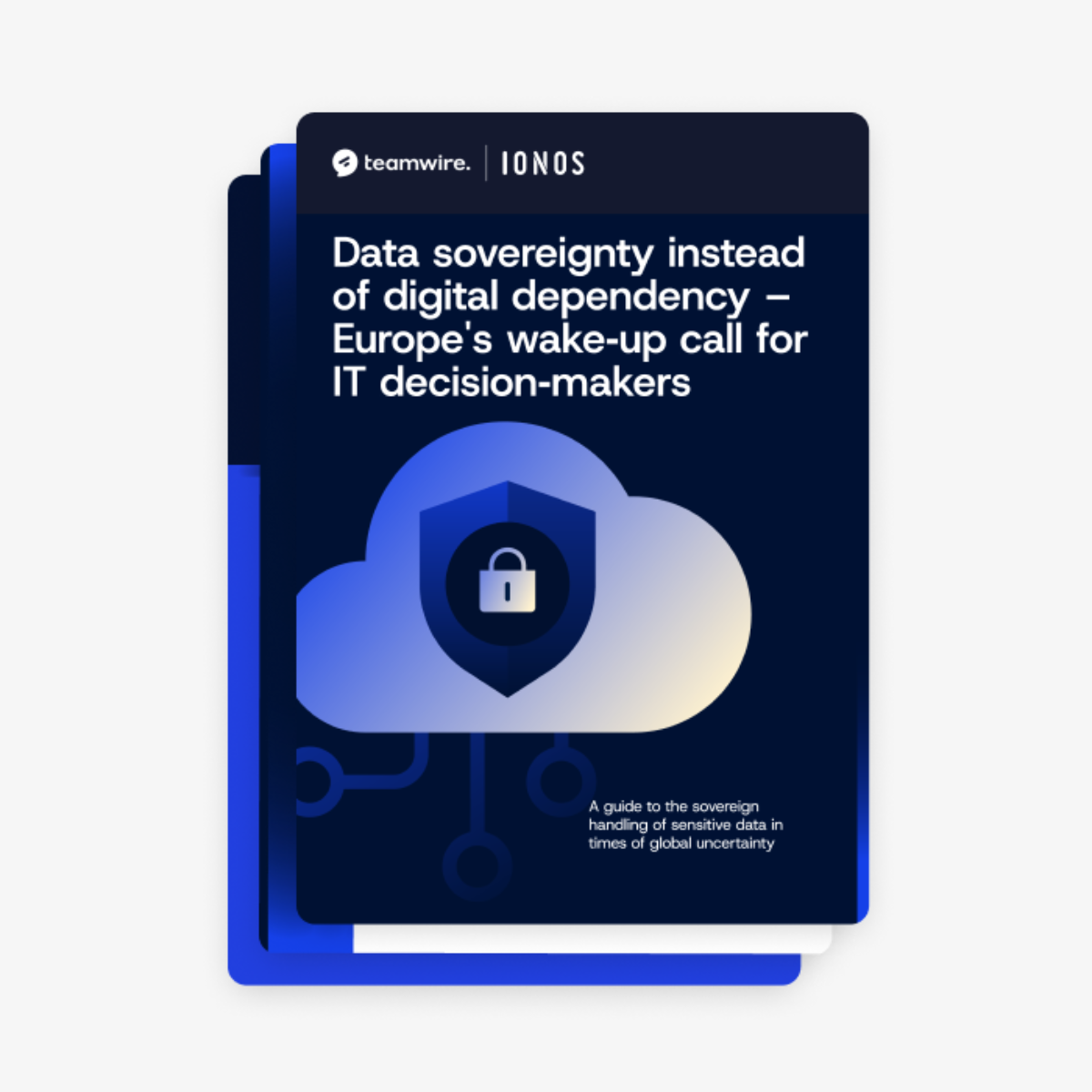Data sovereignty is not a nice-to-have – it’s a duty
Anyone who works with sensitive data has a responsibility – not only to their organizations, but also to citizens, patients, and partners. But how secure is your IT infrastructure really? And how much control do you still have over your data?
This is precisely where our new guide “Data sovereignty instead of digital dependency – Europe’s wake-up call for IT decision-makers” comes in.
Together with IONOS and other European technology partners, Teamwire demonstrates in this practical guide how organizations can regain control of their digital presence and protect themselves against legal gray areas, geopolitical risks, and technological lock-ins.
A guide with a clear mission
In times of global uncertainty, growing cyber threats, and US laws such as the CLOUD Act or FISA, it is no longer enough to rely on local data centers or implement simple encryption solutions. True data sovereignty requires a comprehensive understanding of risks and the will to change.
The guide EU data sovereignty highlights, among other things:
- The differences between data sovereignty, data residency, data privacy, and data security.
- The risks posed by US providers such as Microsoft 365, WhatsApp, and Slack.
- The impact on compliance, audits, and certifications (e.g., ISO 27001, BSI C5).
- Specific recommendations for switching to European solutions,
- And how European providers such as Teamwire, IONOS, Skribble, dox42, Xitrust, and others already offer powerful alternatives today.
Why now?
The NIS-2 Directive, geopolitical tensions, economic pressure on US cloud providers, and a growing societal awareness make it clear that the time to act is now. Europe must take digital resilience seriously – not only from a technical perspective, but also from a strategic one.
With case studies, comparisons, and practical recommendations, the guide is aimed at IT managers, CEOs, CISOs, information security officers, and decision-makers in particularly vulnerable sectors.
Teamwire would like to thank all the partners involved for their joint mission for a sovereign, strong, and secure Europe.
Become independent now
Use the guide as a basis for informed decision-making in your IT strategy and take the first step towards greater control, enhanced security, and increased independence.
Frequently asked questions (FAQs)
What is data sovereignty?
Data sovereignty refers to an organization’s ability to retain complete control over the storage, processing, and use of its data, without dependence on third countries or foreign legal systems. It is about legal, technical, and organizational control over the entire digital infrastructure.
Why is end-to-end encryption alone not enough?
Because it only protects the content, but not metadata such as communication relationships, times, or usage behavior. It is precisely this metadata that can be analyzed by US intelligence services and may pose a significant security risk, especially for critical infrastructure, public safety, authorities, and the healthcare sector.
What are the problems with US cloud providers, such as Microsoft, Google, or Amazon?
These companies are subject to US laws such as the CLOUD Act or FISA. This means that even if the data is physically stored in Europe, US authorities can access it, sometimes without judicial control or notification of the data subjects. The GDPR can thus be effectively undermined.
What does the NIS-2 directive say about data sovereignty?
NIS-2 requires many companies and public bodies to minimize risks in the supply chain, increase the security of their systems, and provide special protection for sensitive data. Remaining with non-European solutions with an uncertain legal situation can lead to compliance violations.
What alternatives are there to US tools?
The guide presents various European providers, such as Teamwire for secure communication, IONOS for hosting infrastructure, Skribble for electronic signatures, dox42 for document generation, and Xitrust for qualified eIDAS-compliant signatures. These providers are GDPR-compliant, auditable, and subject exclusively to European law.
Does switching to European solutions require a significant amount of effort?
No, especially in the area of communication and hosting, there are now established European solutions that are technically equivalent or even superior. Our new guide to EU data sovereignty assists with the transition, from analyzing existing infrastructure to selecting a suitable provider.

